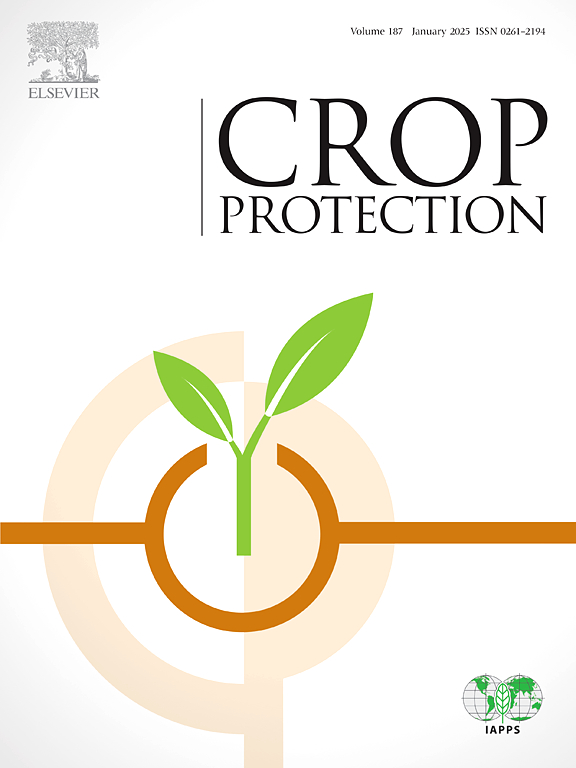A hybrid CNN-transformer network: Accurate and efficient semantic segmentation of crops and weeds on resource-constrained embedded devices
IF 2.5
2区 农林科学
Q1 AGRONOMY
引用次数: 0
Abstract
Weed control plays a crucial role in agricultural production. The utilization of advanced vision algorithms on intelligent weeding robots enables the autonomous and efficient resolution of weed-related issues. Vision transformers are highly sensitive to plant texture and shape, but their computational cost is too high. Consequently, we propose a novel hybrid CNN-transformer network for the semantic segmentation of crops and weeds on Resource-Constrained Embedded Devices. Our network follows an encoder–decoder structure, incorporating the proposed concat extended downsampling block in the encoder, which increases inference speed by reducing memory access time and improves the accuracy of feature extraction. For global semantic extraction, we introduce the proposed Parallel input transformer semantic enhancement module, which employs a shared transformer block to increase the computation rate. Additionally, global–local semantic fusion block mitigates the semantic gap problem well. To fully utilize the transformer’s ability to process plant texture and shape, we employ the fusion enhancement block in the decoder, thus minimizing the loss of feature information. Segmentation results on three publicly benchmark datasets show that our network outperforms the commonly used CNN-based, transformer-based, and hybrid CNN-transformer-based methods in terms of segmentation accuracy. Moreover, our network comprises only 0.1887M parameters and 0.2145G floating-point operations. We also evaluate the inference speed on an NVIDIA Jetson Orin NX embedded system, which result for inference single image 28.28 msec, and achieving a detection speed of 35.36 FPS. The experimental results highlight that our network maintains the best inference speed and exhibits the strongest segmentation performance on resource-constrained embedded systems.
混合 CNN 变换器网络:在资源受限的嵌入式设备上对农作物和杂草进行准确高效的语义分割
杂草控制在农业生产中起着至关重要的作用。在智能除草机器人上使用先进的视觉算法可以自主、高效地解决与杂草有关的问题。视觉变换器对植物纹理和形状高度敏感,但其计算成本过高。因此,我们提出了一种新型混合 CNN 变换器网络,用于在资源受限的嵌入式设备上对农作物和杂草进行语义分割。我们的网络采用编码器-解码器结构,并在编码器中加入了所建议的concat扩展降采样块,通过减少内存访问时间来提高推理速度,并提高特征提取的准确性。在全局语义提取方面,我们引入了拟议的并行输入变压器语义增强模块,该模块采用共享变压器块来提高计算速度。此外,全局-本地语义融合模块能很好地缓解语义差距问题。为了充分利用变换器处理植物纹理和形状的能力,我们在解码器中采用了融合增强模块,从而最大限度地减少了特征信息的损失。在三个公开基准数据集上的分割结果表明,我们的网络在分割准确性方面优于常用的基于 CNN 的方法、基于变换器的方法和基于 CNN 变换器的混合方法。此外,我们的网络仅包含 0.1887M 个参数和 0.2145G 次浮点运算。我们还在英伟达 Jetson Orin NX 嵌入式系统上评估了推理速度,推理单幅图像的速度为 28.28 毫秒,检测速度为 35.36 FPS。实验结果表明,我们的网络在资源受限的嵌入式系统上保持了最佳的推理速度,并表现出最强的分割性能。
本文章由计算机程序翻译,如有差异,请以英文原文为准。
求助全文
约1分钟内获得全文
求助全文
来源期刊

Crop Protection
农林科学-农艺学
CiteScore
6.10
自引率
3.60%
发文量
200
审稿时长
29 days
期刊介绍:
The Editors of Crop Protection especially welcome papers describing an interdisciplinary approach showing how different control strategies can be integrated into practical pest management programs, covering high and low input agricultural systems worldwide. Crop Protection particularly emphasizes the practical aspects of control in the field and for protected crops, and includes work which may lead in the near future to more effective control. The journal does not duplicate the many existing excellent biological science journals, which deal mainly with the more fundamental aspects of plant pathology, applied zoology and weed science. Crop Protection covers all practical aspects of pest, disease and weed control, including the following topics:
-Abiotic damage-
Agronomic control methods-
Assessment of pest and disease damage-
Molecular methods for the detection and assessment of pests and diseases-
Biological control-
Biorational pesticides-
Control of animal pests of world crops-
Control of diseases of crop plants caused by microorganisms-
Control of weeds and integrated management-
Economic considerations-
Effects of plant growth regulators-
Environmental benefits of reduced pesticide use-
Environmental effects of pesticides-
Epidemiology of pests and diseases in relation to control-
GM Crops, and genetic engineering applications-
Importance and control of postharvest crop losses-
Integrated control-
Interrelationships and compatibility among different control strategies-
Invasive species as they relate to implications for crop protection-
Pesticide application methods-
Pest management-
Phytobiomes for pest and disease control-
Resistance management-
Sampling and monitoring schemes for diseases, nematodes, pests and weeds.
 求助内容:
求助内容: 应助结果提醒方式:
应助结果提醒方式:


